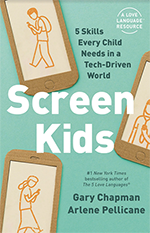Smartphones and Safety
Smartphones and Smart Boundaries
Screens and Online School
Resetting Screen Time
Smartphones and Single Parents (or Grandparents!)
Setting an Example With Screens
Seeking Unity for Screen Time
Even before the coronavirus pandemic shuttered parks, schools, and sports programs for months on end, our kids’ childhood looked different from ours. Most people who grew up before the 1990s spent their free time climbing trees, riding bikes, and inventing games with their friends. A few kids may have had an early video game system, but screens were the exception rather than the rule. Now, our kids have never known a world without smartphones and tablets.
The realities of distance learning and telecommuting have made it an integral part of life. Still, as parents and grandparents, we have a responsibility to weigh our options and understand the implications of placing a screen in our children’s hands.
To address this issue, Turning Point recently interviewed Arlene Pellicane, an expert on the subject who happens to be a long-time friend of the ministry. Before becoming a parent, Arlene played a crucial part in our production department. Now that her kids are older, she devotes herself to encouraging families through her writing and speaking engagements. In 2020, Arlene coauthored Screen Kids and Grandparenting Screen Kids with Dr. Gary Chapman to equip adults with the tools they need to manage technology in the home.
–Arlene
Is it time to press the “reset” button on screen time in your home? Here are some tips from our conversation with Arlene.
Smartphones and Safety
Turning Point: Many parents give their kids smartphones for safety reasons. But in Screen Kids, you present a startlingly different perspective: “I believe it’s safer for [my son] Ethan to bike home from school without a phone than to have easy access to porn through a phone in his pocket.” How did you arrive at that decision?
Arlene: As someone who writes parenting books, you might assume this was all my idea, but my husband, James, is tougher than I am! In terms of safety, he feels it’s vital for our kids to learn to solve problems on their own. He has noticed the kids who have a phone in their pocket for safety rely on Mom and Dad every time they have a problem—any kind of situation. Whether they forgot their lunch or their homework, somebody says something mean to them, or they’re having trouble with their teacher, they just text Mama, and she provides a solution. James wants our kids to learn how to find their own solutions.
We also recognize the temptation that comes with giving kids smartphones. From video games to pornography, it creates a situation where a ten or fourteen-year-old has to fight the temptation. As my husband would say, “It’s too much weight on the bar,” and most kids can’t handle that. That’s why we have decided it’s our job, as parents, to make our kids as safe as possible by eliminating that source of temptation.
Smartphones and Smart Boundaries
Turning Point: You’ve taken a very conservative approach. How do your kids feel about it?
Arlene: My son, Ethan, understands it is a self-control issue. It’s about building healthy habits, and he is financially minded because he keeps his own budget. If he had a phone, he knows he would have to pay for it himself. It’s just not worth it to him. And he has found workarounds. If he needs something, he asks to borrow a friend’s phone or uses a Google Voice number for group chats. Ethan teaches piano and volunteers at church, and he sets everything up himself without having a smartphone.
Turning Point: Your kids seem to be comfortable with the boundaries you’ve set. Has that always been the case?
Arlene: I have renewed confidence in this! When my kids were young, I figured no one would believe me. Now that they’re older, we’re working on a documentary, written from the kids’ perspective, about what it’s like to have a phone-free childhood. Through this process, my high school freshman remarked that spending time online doesn’t provide a sense of accomplishment but finishing a book does. They’ve pointed out that things like social media don’t offer real friendship. They’d rather spend time with one friend than have a bunch of followers online.
The ideal situation is to teach them all this when they are young. As parents and grandparents, we can explain the dangers and how highly addictive it is. Throughout their childhood, my kids have known they’re not going to play video games or spend time on social media or have personal devices. They have access to laptops, notebook computers, and my phone if they need it.

Because my husband and I established the framework early on, this has never been an issue in our home. Our kids know we are for them, not against them, and we will help them pursue their hobbies. Ethan has a YouTube channel for his music. They all use 3-D printing for school. If they want to create something, we help them do that. The key is to frame the conversation in the context of love—to help them understand that we are doing this because it's healthy.
Screens and Online School
Turning Point: For many families, distance learning has created new challenges. How have you adapted your family’s routine?
Arlene: Due to the pandemic, all three of my children have transitioned to full-time distance learning. We’ve found it helpful to maintain a daily rhythm while continuing to minimize other screen time. The kids do their schoolwork from nine to three each day and take a screen-free lunch break at noon. They continue to finish homework until dinnertime, and then they enjoy other activities until bedtime.
There are positives to distance learning. We have learned to embrace the efficiency of it. When they finish their work, they’re done! This has been a great motivation. Of course, my kids are older and more self-sufficient. If they were younger, this would be much harder.
One problem with online learning is too much stimulation. It’s easy to keep multiple windows open, with one for homework, one for communicating with the teacher, and another for messaging a friend. I encourage parents to sit with their children regularly and watch them do their schoolwork. It doesn’t have to be a long time—maybe fifteen or thirty minutes—but this is the best way for parents to help their children develop healthy habits.
It’s also important to schedule other activities whenever possible. Even if it’s socially distanced, wear a mask to church and see friends. Try to create opportunities for your kids to spend time regularly with one or two close friends, maybe in the backyard or the park. For the last several weeks, our family has enjoyed playing ultimate Frisbee. Young people need to move, so look for creative activities while sports are on hold.
Resetting Screen Time
Turning Point: What advice do you have for the parent who needs to reduce their child’s screen time?
Arlene: Dr. Chapman would suggest starting with an apology. Take responsibility for your role in facilitating these habits. Do not shame yourself or your child. Recognize that you have more power and influence than you realize. God’s Word says to “honor your father and mother.” It does not say to honor your tablet and phone. Even if you’re way down the line and you’re just so deep in it, you can know that it’s God’s will for you to parent, and it’s okay if you haven’t done that perfectly.
Your apology might go something like this: “You know what? I have a role as your guardian. I have a responsibility to make you the best adult that you can be, and I’m sorry because I’ve been too busy—it’s been too hard—I didn’t want to upset you—and I’ve let you spend screen time that is not helping you. I’ve noticed that it makes you moody and anxious, and I’m sorry. So, what I want to propose is….”
Before you start the conversation, identify specific goals. Don’t just say, “We’re going to reduce our screen time.” Nobody knows what that means. You might decide to collect all devices at 9 p.m. If a total reset is in order, schedule a 7-day or 30-day detox that culminates with a fun family activity. Look for ways to replace what you are taking away. Play a board game, plan a contest, or go for a nature walk. Be positive. Be confident. Be enthusiastic. Make it as fun as you possibly can. This will be more work for you, but it will help your kids discover new hobbies and develop new habits.

Your child will not be happy about the changes, so address that. Let them know, “I’m sure you think I’m mean, and I don’t understand, and I’m trying to ruin your life. I’m sure you think those things, but I want you to know I’m doing this because I love you, I care about you, and I think this is the best for you.” They might scream or not talk to you for a week, but be consistent and remember you are the parent. You are not there to be popular—you are there to protect your child.
Smartphones and Single Parents
Turning Point: What do you suggest for the single parent who feels like there aren’t enough hours in the day? Or the grandparent who may be raising their grandchild and just doesn’t have the energy to keep up?
Arlene: I think there comes the point when you decide something has to give—when you become convinced that things can’t continue the way they are. It does take a lot of momentum and energy to start something new. But some changes can help the rest fall into place. For instance, an earlier bedtime gives you more time in a quiet house to collect your thoughts, to get ready for the next day. It creates positive changes for your child and you.
I will tell you, my kids are older, but by 8:30, they are winding down. They are reading in their rooms. This practice builds a calming routine that would help the single parent. You can expect resistance at first, but it will improve their behavior because they’re getting more sleep. And the parent will feel more rested too.
Find friends that support your emotional needs so that you’re not relying on your children for support. When you don’t have another adult in the house, the kids sometimes become your primary companions. It creates a situation where you are less likely to cross them because you don’t want to upset them. Having a dear friend, perhaps another single parent or your parent, provides healthier emotional support and a greater sense of community.
Setting an Example With Screens
Turning Point: In Screen Kids, you talk about the importance of parents modeling healthy screen habits. With so many of us parents working from home, how can we teach our kids to find a balance?
Arlene: The apostle Paul says, “Follow my example as I follow the example of Christ” (1 Corinthians 11:1, NIV). We, as parents, are the model for our children for better or for worse. We don’t have to do it perfectly, but there’s this idea of “you can follow me digitally because I follow Christ.” The way our children see us interacting with technology is just as important as it is for them to see us go to church and tithe. The way we use technology reveals a lot about our walk with Christ.

Our kids need to feel like they’re more important than our phones. A simple way to check is to ask them. We can say, “Do you feel like Mommy’s on the phone too much?” God calls us to “love one another,” not our phones. Phones don’t care if we look at them, but our children care very much. People take priority over technology.
We need to ask ourselves, “If my child grew up to use technology just like me, would I be pleased?” It’s okay if the answer is “No.” The next step is to determine what we can do to change. It’s healthy for our children to see us growing and admitting our mistakes. Look for opportunities to create slices in the day when you can set everything aside and give your kids your full attention.
Seeking Unity for Screen Time
Turning Point: Early in your parenting journey, you and your husband agreed to create a healthy digital environment for the kids. What advice do you have for the parent who wants to make positive changes, but their spouse or other caregivers don’t agree?
Arlene: I would start with prayer. Even if some people in this equation do not follow God, you can be the sanctifying presence in this child’s life. Ask God to intervene and bring unity. Then approach the people you disagree with as graciously as possible. If you’re a grandparent, you need to respect your adult child’s authority as a parent. Instead of presenting a list of twenty things that are going wrong, pick the main thing that you would like to see change.
Look for common ground. Even if you don’t agree on all the details, everyone involved has similar goals. You all want Johnny to be healthy, have a family someday, do well in school, and be active. Then be prepared to compromise. You may win them over on some things. They may win you over on other things, or you may meet in the middle. You might not get to where you want to be, but you can improve. It’s essential to value your relationships over being right.
If you believe there’s a situation that places your child in physical or spiritual danger, you need to act. Don’t worry about offending someone. If you knew your child was at risk of becoming a drug addict, you would take steps. You might move. You might start homeschooling. You would do some radical things to get them away from a particular group of people. Digital addiction has the potential to stay with your child for their entire life, so you might need to take those same radical steps. If everyone is not in agreement but you know it’s the right thing to do, be courageous and take those radical steps.
Turning Point: This topic is so timely. Thank you, Arlene, for bringing biblical wisdom to the subject of screen time and sharing your expertise with our readers.
~ ~ ~ ~ ~
To learn about the 5 Skills Every Child Needs in a Tech-Driven World, purchase your copy of Screen Kids or Grandparenting Screen Kids today.


